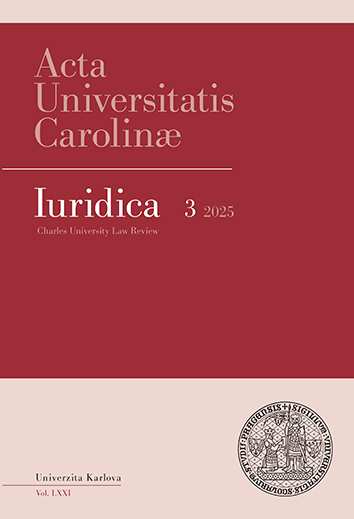Acta Universitatis Carolinae Iuridica (dále jen AUCI) je hlavním časopisem Právnické fakulty UK. Vychází od roku 1954, patří tak mezi tradiční právnické časopisy teoretického zaměření.
Jako obecný právnický časopis přináší delší studie i kratší články o jakýchkoli relevantních otázkách v právní teorii i mezinárodním, evropském a vnitrostátním právu. AUCI také publikuje materiály vztahující se k aktuálním otázkám legislativy. AUCI je recenzovaný časopis a přijímá příspěvky od českých i zahraničních autorů. Příspěvky zahraničních autorů jsou zveřejňovány v původním jazyku – slovenštině, angličtině, němčině, francouzštině.
AUCI je teoretický časopis pro otázky státu a práva. Jeho vydavatelem je Univerzita Karlova v Praze, Právnická fakulta, prostřednictvím nakladatelství Karolinum. Vychází čtyřikrát ročně, termíny vydání časopisu naleznete zde.
Články uveřejněné v časopise AUCI procházejí nezávislým recenzním řízením (peer review), které je oboustranně anonymní. Posuzovatelé z daného oboru vyjadřují své stanovisko k vědecké kvalitě příspěvku a vhodnosti publikace v časopisu. V případě připomínek je stanovisko zasíláno zpět autorovi s možností přepracování textu (blíže viz Pokyny pro autory – Průběh recenzního řízení).
Časopis AUCI (ISSN 0323-0619) je evidován v České národní bibliografii (vedena Národní knihovnou ČR) a v Index to Foreign Legal Periodicals (veden American Association of Law Libraries). AUCI má přiděleno evidenční číslo periodického tisku e. č. MK E 18585.
V r. 2021 byl jako první časopis Právnické fakulty Univerzity Karlovy zařazen do prestižní mezinárodní databáze Scopus. Tato databáze společnosti Elsevier je největší abstraktovou a citační databází recenzované literatury na světě. Od zařazení do elitní databáze Scopus si redakce časopisu slibuje nejen zvýšení čtenosti časopisu, ale také nárůst zájmu o publikaci příspěvků jak českých, tak zahraničních autorů.
AUCI je tzv. časopisem otevřeným a veškerý jeho obsah je zveřejňován jak na webu fakulty, tak na webových stránkách nakladatelství Karolinum. Přístup k němu je bezplatný. Domovská stránka časopisu AUCI je na webových stránkách Nakladatelství Karolinum.
Časopis AUCI využívá licenci Creative Commons: CC BY 4.0.
Dlouhodobou archivaci digitálního obsahu časopisu zajišťuje Portico.
AUC IURIDICA, Vol 33 No 1 (1987), 57–75
Sociální aspekty v soustavě zdaňování obyvatelstva
[Social Aspects in the System of Taxation of the Population]
Miloš Borovička
DOI: https://doi.org/10.14712/23366478.2025.489
zveřejněno: 07. 08. 2020
Abstract
The share of the taxes paid by the population in the revenue of the Czechoslovak budgetary system amounts to some 13% and is, therefore, compared to the decisive revenue from the socialist economy, only a complementary resource. However, the taxes keep their importance in view of their other functions which they perform and where their social function takes a significant part. It consists in the regulation of the monetary income of the population under various social aspects, in which the social situation of individual taxpayers is reflected with the object to scale the tax burden in respect of chargeability. Typical for the Czechoslovak system of taxes paid by the population is the marked subjectivisation of taxes of the income tax type, all of them taking account of various social contingencies essentially affecting their size. The effectiveness of the social function is dependent above all on the choice of the social aspects taken into account for assessment. The range of the social aspects taken into consideration is, however, not the same for the various taxes and there are also differences in the conditions set down for their application. Most important of the social aspects taken into account is the number of persons maintained by the taxpayer, recognised as such being usually children, wife or husband and/or other persons maintained by the taxpayer. Of other social aspects taken account of is disability of the taxpayer or persons in his maintenance, the age and sex of the taxpayer, his family status or the fact that he is maintaining children as self-supporting breadwinner or that he had raised at least one child. Of importance for the effectiveness of the social function is also the way in which the respected social aspects are applied to the tax construction. Used for all the income taxes paid by the population are progressive tax rates, their social action consisting in that the tax burden is increasing with the growth of the taxpayer’s income in which his higher taxability is reflected. However, the progressive rate cannot affect individual differences in the social conditions of the various taxpayers resulting above all from the different number of persons maintained by them. That is the reason why the progressive rate is complemented either with a system of percentual surcharges or allowances whereby the basic tax computed at the rate is increased or reduced or with a system of fixed amounts deductable from the tax basis or the two systems are combined. Consideration of some of the social aspects is left to the discretion of the financial authorities administering the tax who may on their basis grant taxpayers individual tax relief. The existing ruling on the social aspects is not quite satisfactory and much too complicated. Contribute to its rationalisation could the following measures: a) To unify the range of acknowledged social aspects and the conditions for their acknowledgement in respect of all the taxes paid by the population; b) to objectivise the range of acknowledged social aspects and to exclude those whose application had been overridden by developments, or which lack particular grounds; c) to consider the transfer of some of the social aspects still acknowledged as reason for tax relief to the sphere of social benefits; d) when granting tax relief instead of percentual deductions from the basic tax which, owing to their relative colligation with the size of the income, have an asocial effect (the higher the income, the higher the tax deduction) to give preference to the deduction of fixed amounts from the basis of the tax. These measures could bring improved effectiveness to the system of application of social aspects as well as its overall simplification and reduction of the administrative exertion connected therewith in its existing form.

Sociální aspekty v soustavě zdaňování obyvatelstva is licensed under a Creative Commons Attribution 4.0 International License.
230 x 157 mm
vychází: 4 x ročně
cena tištěného čísla: 65 Kč
ISSN: 0323-0619
E-ISSN: 2336-6478
